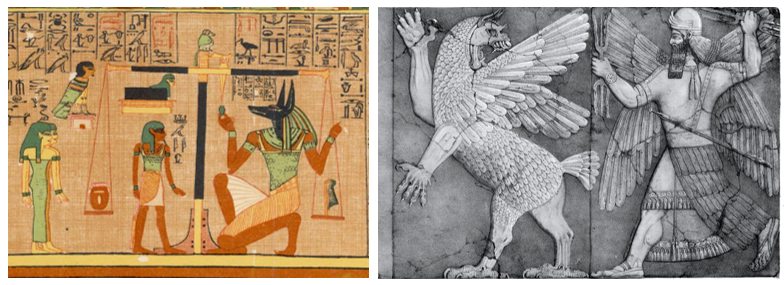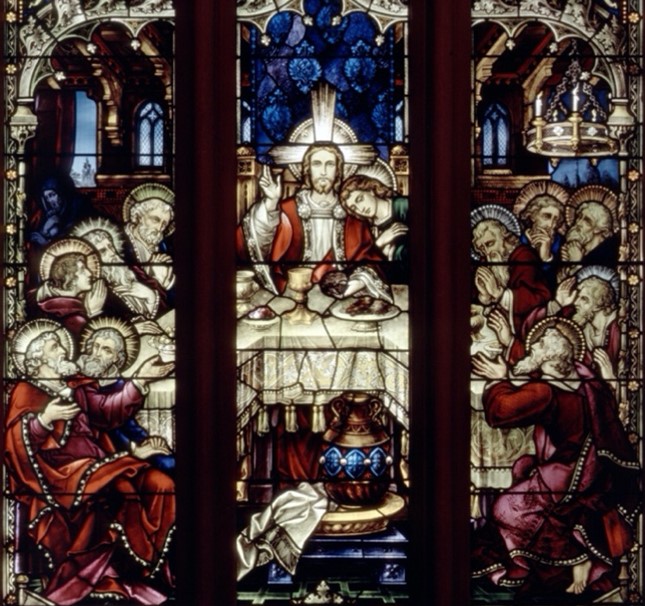HOMILY FOR MASS IN TIME OF PANDEMIC ON THE 21ST SUNDAY OF ORDINARY TIME YEAR B

Live-streamed from St. Mary’s Basilica, Sydney, 22 August 2021
Martin Scorsese’s film, Shutter Island, is a neo-noir psychological thriller set in 1954. Leonardo DiCaprio plays U.S. Marshall Teddy Daniels who visits the island with his partner to investigate the disappearance of a patient from the Hospital for the Criminally Insane. His ulterior motive is to find his wife’s killer, who is rumoured to be an inmate.
Through many twists and turns Teddy eventually discovers—spoiler alert—that he is in fact an inmate and his wife’s killer. Though the situation was set up to make him face reality, he maintains his fantasy, the truth being too much to bear. Teddy is taken away to be lobotomised, but not before asking the psychiatrist whether it would be ‘worse to live as a monster or die as a good man?’—suggesting he has neither regressed fully into fantasy nor progressed to facing the truth.
Not the film to watch if you’re looking for a few laughs to combat cabin-fever! But it very successfully examines how hard it can be to discern the real truth of things. Some things in life are complicated and there are many facts and evaluations, many of them contested, politicised, even weaponised: just think of all the controversy and confusion there’s been about the pandemic and the appropriate responses, including vaccines and lockdowns. We may be disinclined to do the hard thinking or lack the self-confidence to try. Modernity, after all, teaches us there is no reality ‘out there’ to know anyway and the most we can hope for is something ‘truthish’ in a world of ‘alternative facts’.
But there are other reasons for our reticence. If we look too hard at our world or ourselves, we might not like what we see. Things like our pandemic might incline us to putting our head in the sand or, like Teddy, to indulging various illusions. But the truth continues to interrogate us regarding our social structures, institutions and practices. Even more confronting, it shines light on our personal lives: the proud bits and the sordid, the wise and the prejudiced. It exposes our inhumane behaviour, poor relating and self-centredness, our unfaithfulness to each other and to God. Truth tells us we are gifted, virtuous, generous people—but can reproach us about how we use our gifts, the vices choking the virtues in the garden of our souls, the limits to our generosity.
So it’s not just because truthis so hard to capture and communicate that modernity avoids it like the COVID; it’s because it is so disturbing. Truth demands intellectual, moral and spiritual conversion—and we often resist.
Often in life we go for what is easiest rather than what is best. Just think of what drives many people’s voting come election time. The same is true when it comes to deciding who or what is sovereign in our lives. In our first reading (Jos 24:1-2. 15-18) God and Joshua have had enough. The people are told that, since they’re not following the God of Israel, they might as well adopt some of their neighbours’ gods.

Frightening gods these, unlike Israel’s God of mercy and compassion. There was the fierce god of storms, Amurru of the Amorites, his blood-thirsty queen Athirat and their 70 divine sons. Or the jackal-headed Egyptian god of the under-world Anubis, his half-pharaoh, half mummy successor Osiris, and his murderer Seth god of chaos and violence. Or Osiris’ sister and wife Isis, who wears cattle horns and a solar disk, and their falcon-headed son Horus, god of war and hunting. Go join them, Joshua teases, if you won’t serve the one true God; see what they’ll do for you…
So, too, in our Gospel (Jn 6:60-69): after hearing Jesus’ strange doctrine of the Eucharist, some disciples abandon Him. He might bring the truth or be Truth itself,[1] but truth is too much for some—on Shutter Island, in ancient Israel, even in the contemporary Church.
: “Does my teaching upset you?” Jesus asks. He won’t dilute the Gospel for popularity’s sake. Unconvinced by His signs and teachings to date, they’re unlikely to acknowledge Him even if He ascended to heaven. Just as Teddy Daniels prefers madness to truth, so too, in Jesus we come face-to-face with Truth and some do not welcome this.
Before we join exasperated Joshua in judging ancient Israel or Jesus the just judge in assessing them a millennium later, we should attend to a crucial fact: that in today’s readings it’s the faithful who defy the God of Israel not the surrounding tribes, the faithful who resist Jesus, not the civic and religious authorities. John tells us that “after this, many of his disciples left [Jesus] and stopped going with him.” It was Christians who resisted His hard teachings, insiders as much as the still-to-be-so.
These disciples are us. We may not leave Jesus altogether, but at one time or another we wander down some side-path, some imagined short-cut to happiness. We resist those parts of faith or morals that don’t suit us or that demand too much. Surveys suggest that a significant proportion of those who identify as Catholic today reject some core teachings of the faith. Even some Mass-goers deny that in the Eucharist we receive the very substance of Jesus—God and man.[2] They too are uncomfortable with Jesus’ words “I am the Bread of Life… come down from heaven… Whoever eats this Bread will live forever; and that Bread is my flesh, given for the life of the world… Those who eat my flesh and drink my blood abide in me and I in them.” (Jn 6:35-59) A ‘hard teaching’ indeed – but a clear one!
So Response A is to abandon Christ wholly or in part. But our story identifies another possibility: some stay close to Jesus and His Church. “Lord, to whom shall we go?” Peter says, “You have the words of eternal life, and we believe that you are the Holy One of God.” As we offer today the Mass in Time of Pandemic, we are aware that it is only the One who is Food for minds and souls who can bring us the healing and protection, the courage and compassion we need in times like these.

So the Apostles stayed, all the way to that Supper when at last they received His Body and Blood, convinced like all the saints since that however uncomfortable it can be at times, truth is freedom. Truth liberates us from falsehood, superstition, fear. From the mirages created by various interests and the illusions we create for ourselves. Truth dis-illusions, without making us cynical. It releases the spirit from unnecessary anxiety. It heals inauthenticity, the division of heart that is so corrupting. Only Truth sets us free (Jn 8:32), free from all that holds us back from being all that we should be, free to love and serve.
Back in the ’50s, the brilliant and feisty Southern writer Flannery O’Connor was listening uncomfortably to a group of socialites sharing their fancies. After listening to a Catholic woman prattling on about the ‘symbol’ of the Eucharist, Flannery had had enough: “I then said, in a very shaky voice, ‘Well, if it’s [just] a symbol, to hell with it.’ That was all the defence I was capable of [at the time] but I realise now that this is all I will ever be able to say about it, outside of a story, except that it is the centre of existence for me; all the rest of life is expendable.”[3] That’s Option B: the choice for Christ who is the Bread of Life and Truth incarnate. A choice made not just once for all time, but each day and especially every Sunday. Which will we choose?
WORDS OF THANKS AFTER HOLY COMMUNION AT MASS IN TIME OF PANDEMIC
Live-streamed from St. Mary’s Basilica, Sydney, 22 August 2021
In this time of struggle for many, I am proud of all our Catholic community is doing to assist: our parishes, that are doing all they can to stay connected to people and keep serving them; our Catholic hospitals and aged care facilities, caring for so many in very difficult circumstances, including for some suffering from COVID; our Catholic schools, doing their best to ensure an excellent education despite present limitations; our welfare agencies, providing counselling, food and other practical help to those who are suffering in these times. Many individual Christians are also providing love and care to their neighbours and to those who are isolated and anxious. You might wonder what can you do. Today we have done the greatest thing we can do: we can pray for each other. Pray for an end to this pandemic, pray for the safety of all those you love and of your neighbours, pray for health in our times.
[1] Jn 1:14,17; 8:40-46; 14:6; 17:17-19; 18:37-38.
[2] Gregory Smith, ‘Just one-third of U.S. Catholics agree with their church that Eucharist is the body, blood of Christ,’ Pew Research Center 5 August 2019 https://www.pewresearch.org/fact-tank/2019/08/05/transubstantiation-eucharist-u-s-catholics/. A more positive picture is given in Tracy McEwan, “Changing patterns of religious practice among Church-attending Catholic women in Australia,” Journal for the Academic Study of Religion 31(3) (2018) https://journals.equinoxpub. com/index.php/JASR/article/view/37574
[3] Anna Krohn, ‘The age of unbelief,’ Catholic Weekly 29 August 2019 https://www.catholicweekly.com.au/anna-krohn-the-age-of-unbelief/
Welcome to St Mary’s Cathedral in Sydney, for the Solemn Mass of the 21st Sunday of Ordinary Time. As numbers of COVID-19 cases in NSW continue to be stubbornly high and our lives are severely restricted, the National Council of Churches has nominated today as a National Day of Prayer for an end to the pandemic under the theme of ‘Lord have mercy’. This day of prayer acknowledges the distress caused by the pandemic and unites us in prayer that the Lord will pour out His mercy upon: the victims and those grieving them; the sick and those caring for them; the researchers and those vaccinating and testing us; the isolated and anxious; those whose education, finances or relationships are under pressure; those keeping our essential services going, such as our schools; our pastors attending the sick but missing their flocks; those leading us through this crisis; and every Australian, since all are potential victims and all affected by the present situation.
With all these needs in mind we will today offer the Special Mass in Time of Pandemic. To everyone watching via livestream, a very warm welcome!

